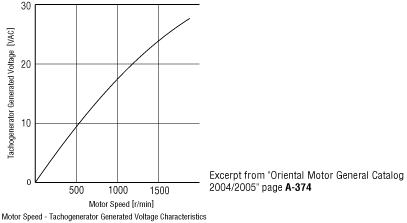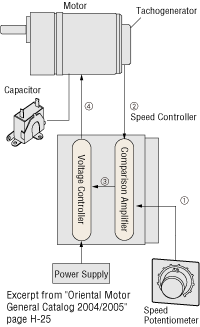It's an AC Speed Control Motor, But I Can't Adjust the Speed. Why is this?


-

Hmmm...
-

Oh, what are you grimacing and worrying about today?
-

A customer asked to see the speed control motor in real, and he will come to the showroom tomorrow. When I tried to check the operation of the motor in advance, I found that I couldn't adjust the speed. I wonder if something is broken.
-

Are you sure it's broken? Did you check it properly?
-

No, I'm not sure know how I'm supposed to check it...

-

First, make sure that the wiring is correct! Check it against the wiring diagram.
-

Let's see, white is here, black is here, blue is.... Huh? One of the blue lead wires is disconnected.
-

It's a thin blue lead wire, isn't it? That's the reason. Reconnect the wires according to the connection diagram and try again.
-

OK. Oh, you're right. It works fine. I can adjust the speed. But why can't I adjust the speed if this thin blue lead wire is disconnected?
-

This thin blue lead wire is the lead wire coming from the tachogenerator. Once you understand the operating principles of the speed control motor, you'll be able to figure it out too, Vex.
-

Ms. Ori, please teach me.
-

Okay, ready? First of all, the torque that is output by an AC motor depends on the voltage. The lower the voltage, the less torque you'll get. It uses this characteristic to perform speed control.
-

Hmm. I understand the torque getting lower, but what does that have to do with speed control?
-

Ready? Attached to the back of the speed control motor is a tachogenerator, which acts like a generator.
The faster the motor's rotation speed, the higher the voltage generated, and the slower the motor's rotation speed, the lower the voltage generated.
In other words, the voltage output from the tachogenerator will tell us the rotation speed of the motor.
-

I see...
-

The speed controller uses the feedback voltage to detect the motor speed.
It then compares the speed set by the potentiometer with the motor rotation speed detected by the tachogenerator.
If the motor rotation speed is faster than the setting speed, the voltage applied to the motor is lowered to reduce the speed, and if it is slower than the setting speed, the voltage applied to the motor is raised to increase the speed.
This is continually repeated to keep the motor speed the same as the setting speed.

-

I see, so it adjusts the voltage applied to the motor so that it rotates at the setting speed.
-

That’s right. Then think about what would happen if the tachogenerator's lead wires were disconnected.
-

If the tachogenerator's lead wires were disconnected...it wouldn't be able to find the voltage, and... Let's see...
-

What would the voltage be if the lead wires weren't connected?
-

The voltage would be...0 V?
-

So, how does the speed controller determine the state of the motor?
-

It would determine that...the motor is stopped...and it would increase the applied voltage. And even if it increases it, since the tachogenerator is not connected, it would think that the motor is still stopped, and increase the applied voltage even more. I see. So that's how it is.
-

That’s right. Basically, if it was a 100 V input type, it would apply the full 100 V to the motor. Therefore, the motor rotates at full speed, but it would not be able to speed control even by turning the potentiometer.
-

Now I get it! That's how it is. You really do know everything, don't you, Ms. Ori?
-

Not really. In fact, I attended a technical seminar just the other day. The seminar instructor described everything to me in a way that I could understand.
-

Is the technical seminar the one of those seminars that you asked customers to attend? Can I also attend?
-

Sure you can. You can check the schedule and sign up on the website. Just be sure not to disturb the customers.
-

I know, I know. Alright, I'm going to attend tomorrow.
-

Come on, didn't you say that a customer coming tomorrow to see the speed control motor? There are technical seminars held every month in various locations around the country, so you'll need to plan accordingly and... Ah, wait! Ahh. He's gone. I hope Vex will ever listen to me properly, like a speed control motor does...